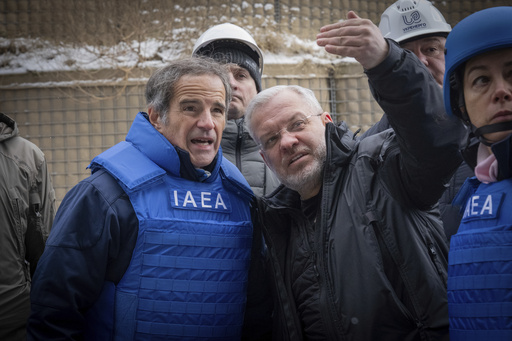
KYIV, Ukraine — The leader of the United Nations atomic regulatory agency announced on Tuesday plans to travel to Moscow in the near future for discussions concerning Russia’s ongoing attacks on Ukraine’s energy infrastructure, which pose a significant risk to nuclear safety.
Rafael Grossi, the director general of the International Atomic Energy Agency (IAEA), noted that there have been several instances of close calls involving Europe’s largest nuclear facility located in Zaporizhzhia, which remains under Russian control. He refrained from placing blame on either party for the assaults on the plant, citing its proximity to the front lines as complicating factors in identifying responsible parties.
In Ukraine, the three operational nuclear power plants are responsible for generating over half of the nation’s electricity, and the frequent threats from Russia jeopardize their capacity to operate effectively. The Zaporizhzhia plant, now out of Ukrainian hands, was taken over by Russian forces during the initial stages of the large-scale invasion and ranks among the world’s ten largest nuclear facilities.
During a recent visit to an electrical substation in the Kyiv region, Grossi expressed concern that damage to critical infrastructure relating to power generation introduces risks to nuclear safety, especially with the potential disruption of essential cooling systems at nuclear power plants.
Russia has systematically targeted Ukraine’s power grid, aiming to cut off essential services such as heat, electricity, and running water, thus attempting to undermine the morale of the Ukrainian people. These attacks have also disrupted the country’s defense manufacturing capabilities.
The ongoing conflict has heightened fears of a nuclear disaster, with the Zaporizhzhia plant often situated in the line of fire in armed clashes. Despite the closure of its six reactors for several months, it remains reliant on external power and qualified personnel to maintain critical cooling and safety systems.
Grossi emphasized that attacks on electricity substations can directly impact nuclear safety. He pointed out that if substations supplying power to nuclear facilities are compromised or cease operations, the emergency diesel generators serve as the final line of defense against potential disasters.
“In the case of a large nuclear power station, you’d prefer not to rely on a last line of defense,” Grossi remarked during an interview following his visit.

